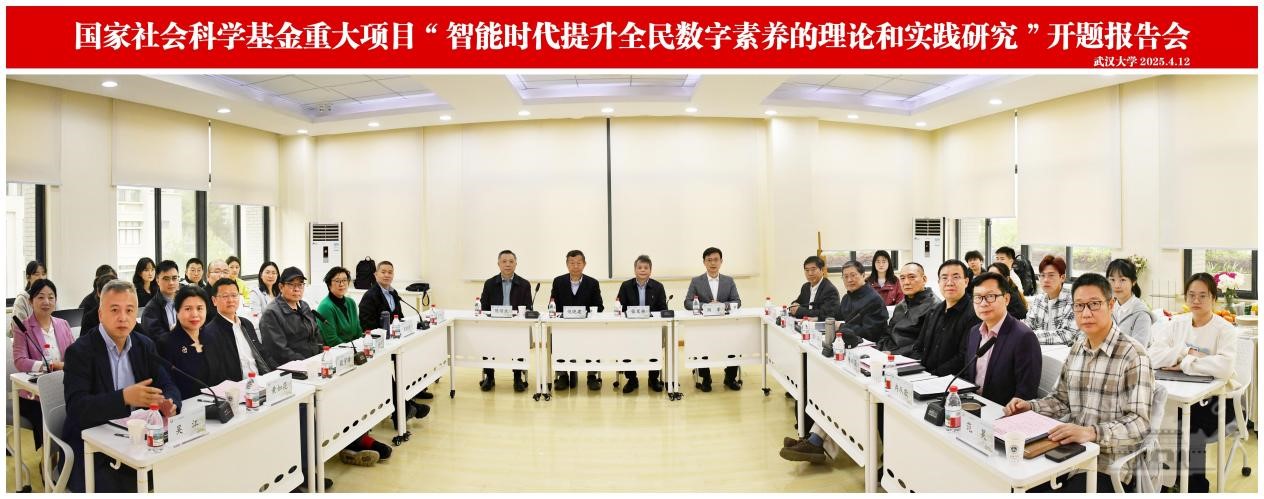On April 12th, the opening meeting of the National Social Sciences Fund Major Project "Theoretical and Practical Research on Improving National Digital Literacy in the Intelligent Era", with Professor Li Si at the School of Information Management serving as the chief expert, was held.

Ni Xiaojian, the former Director of the Capital Library, served as the Leader of the expert evaluation panel.
The panel also included the following experts:
Chuanfu Chen, University Distinguished Professor in Humanities and Social Sciences at Wuhan University;
Ping Ke, Professor at the Department of Information Resource Management of Nankai University;
Shujin Cao, Professor at the School of Information Management of Sun Yat-sen University;
Xiaoying Zhou, Professor at the School of Information Resource Management of Renmin University of China;
Gang Li, Professor at the School of Information Management of Wuhan University;
Jiuzhen Zhang, Director of the Department of Information Management at Peking University;
Jianxun Zeng, Professor at the School of Information Management of Central China Normal University;
Xinya Yang, Executive Deputy Director of the Propaganda Department at Chongqing University;
Yufeng Duan, Professor at the Department of Information Management at East China Normal University;
Ximing Xiao, Professor at the School of Information Management of Wuhan University;
Ruhua Huang, Professor at the School of Information Management of Wuhan University;
Congjing Ran, Professor at the School of Information Management of Wuhan University;
Hao Fan, Professor at the School of Information Management of Wuhan University;
Moreover, Falin Zhang, Associate Dean of the Academy of Humanities and Social Sciences, Wuhan University;
Jun Tao, CPC Secretary of the School of Information Management, Wuhan University,
Jiang Wu, Associate Dean of the School of Information Management, Wuhan University, attended the meeting.
Jiang Wu presided over the opening ceremony, extending sincere welcome and heartfelt gratitude to the leaders and experts. In his speech, Falin Zhang put forward expectations for the project research from three aspects: "consolidating the theoretical foundation", "constructing inclusive solutions", and "promoting ecological consensus". Jun Tao fully affirmed the project team's exploration in digital and intelligent transformation, suggesting that the team highlight research priorities and strive to create high-quality achievements with both theoretical depth and practical value, contributing to the construction of a Digital China.
Xiaojian Ni presided over the kick-off report session. On behalf of the project team, Li Si elaborated on the research framework of the project from six aspects: the background and value of the topic, the expected goals of the project, the overall framework and ideas, the main contents of the sub-projects, the key difficulties and innovative points, the progress arrangement, and the final results, as well as the collaborative research direction of the four major dimensions and five sub-projects.
At this kick-off report meeting, the experts carried out in-depth discussions on the connotation, boundaries, target groups, implementation paths, and technical support of digital literacy, further clarifying the strategic significance and practical orientation of the project research. The experts unanimously agreed that a theoretical system of digital literacy with Chinese characteristics, forward-looking of the times, and practical guiding significance should be constructed. Aiming at the grand proposition of "the whole people", the experts suggested that the project should focus on key groups and key scenarios, especially in digitally disadvantaged areas such as rural areas, vulnerable groups, and western regions, and focus on key fields such as education and employment. The practicability and generalizability of the research should be enhanced to promote the effective implementation of research results.
Li Si expressed heartfelt thanks to the experts for their opinions and suggestions, believing that the targeted strategies proposed by the experts not only broadened the research vision of the project team but also provided important inspiration for the practical path. In his concluding remarks at the meeting, Xiaojian Ni pointed out that the project should seize the opportunity of the times, integrate resource forces, promote the paradigm shift of digital literacy under the background of the intelligent era, and make positive contributions to improving the national digital literacy level, narrowing the digital divide, and helping the Digital China strategy through the construction of a sustainable mechanism and the exploration of platform-based paths.